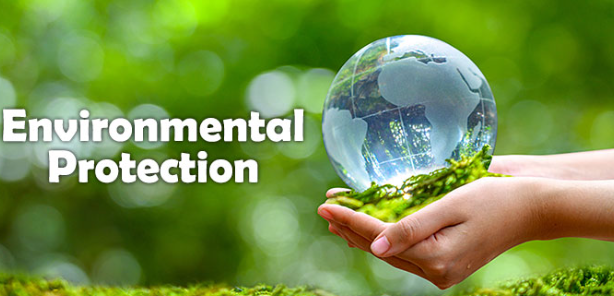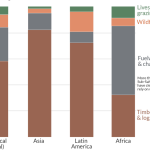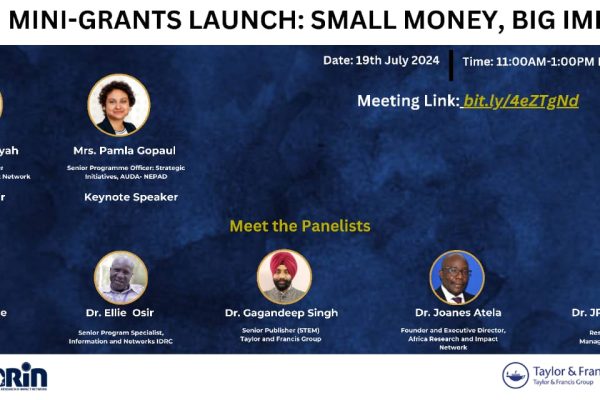By Emily Bolo (ARIN) and Florence Onyango (ARIN).
Introduction
“The greatest threat to our planet is the belief that someone else will save it,” Robert Swan.
20% of the earth’s land is degraded; a phenomenon that aggravates climate change and drives the extinction of species. Human activity has been cited to be a major contributor to land degradation, drought, and desertification leading to reduced productivity of ecosystems. According to UN reports, 40% of the degraded land is attributed to human activities. While agricultural expansion is a key catalyst to deforestation, the use of traditional cooking methods plays a significant role as well (See Fig. 1). In Africa, the lack of clean cooking technologies presents itself as a major driver for deforestation. Approximately 47% of the trees harvested in Africa yearly are used at the household level as a source of biomass energy for cooking. This overreliance on solid biomass leads to the loss of biodiversity, which greatly affects ecosystem functions. For example, it is estimated that 50% of bird and mammal species in Africa will be lost due to land degradation. Given that human life is dependent on productive lands, halting land degradation is crucial if the earth’s biodiversity is to be enhanced, ecosystem services restored, and climate change impacts mitigated. This aligns with the theme for this year’s World Environment Day which focuses on “Land restoration, desertification, and drought resilience.”
Clean Cooking and how it contributes to Land Restoration
Almost 31% of the earth is covered by forests, which provide home to over 80% of all land animals, plants, and insects. The urgency to safeguard biodiversity overlaps with and underscores the need for energy transition. In a more integrated approach, the electricity-water-land-forest mode of development is useful for ecological restoration while clean electricity qualifies as a driver for ecological sustainability. The adoption of clean cooking technologies can thus help achieve the goals of SDG 15 that aims to “protect, restore and promote sustainable use of terrestrial ecosystems, sustainably manage forests, combat desertification, and halt and reverse land degradation and halt biodiversity loss” through the promotion of sustainable practices that reduce environmental degradation.
Reduced Deforestation
Adoption of clean cookstoves will help ease pressure on forest resources. Currently, approximately 80% of the African population depends on biomass fuel for their cooking needs which leads to deforestation and degradation of forested areas. If this population is transitioned to clean cooking technologies such as energy-efficient electric stoves, biogas, and LPG, their need for these unsustainable fuels will be reduced. By decreasing the demand for wood and charcoal, clean cooking will also help in the preservation of forests, which are vital for sustaining biodiversity, checking soil erosion, and maintaining water cycles.
Figure 1: Drivers of Deforestation (Source)
Biodiversity Conservation
Africa is among the most biodiverse regions, hosting 25% of the world’s biodiversity. However, this biodiversity is threatened by unsustainable practices that expose the continent to further loss. During the 1st Joint International Scientific Conference co-organized and co-hosted by the National Museums of Kenya and the Association of Kenyan Entomologists that took place from the 3rd to 5th June 2024, Dr. Jared Bosire of UNEP asserted that bending the curve on biodiversity loss will require very ambitious targets to be set. Some of the ambitious targets include protecting 30% of land and sea, halting deforestation by 50%, and reducing the emission of GHGs by 50%. Consequently, the adoption and sustained use of clean cooking technologies can significantly help bend the curve on biodiversity loss by reducing deforestation and degradation as well as help protect natural habitats. This conservation is important for maintaining biodiversity and supporting ecosystems that contribute to land health and resilience. Besides, healthy forests and lands offer crucial ecosystem services, such as flood regulation, water filtration, and a conducive environment for pollinators, which are vital for agriculture and overall environmental health.
Carbon Sequestration
Clean cooking technologies play a very important role in reducing carbon emissions as they emit less greenhouse gases compared to traditional cooking methods. Studies have shown that the sustained use of modern cook stoves can considerably reduce the emission of black carbon by up to 90% and, therefore, contribute towards climate action. In Kenya, for example, the use of polluting fuels for cooking is responsible for the emission of approximately 35% of the total GHGs discharged in the country. The magnitude of the problem has seen the Kenyan government commit to minimize its GHG emission by 30% with clean cooking expected to account for 14% of the reduction. By lowering the emission of carbon, clean cooking helps mitigate climate change, which directly and indirectly affects land health and restoration efforts. Moreover, with reduced pressure on forests for fuel, reforestation and afforestation projects can be more successful, contributing to carbon sequestration and overall land restoration.
Conclusion
Combined efforts, both at the global and regional levels, are needed for forest ecosystems to be sustained owing to their environmental, social, and economic functions, especially in developing countries. To realize SDG15, the relationship between humanity and nature has to be enhanced. Careful consideration has to be given to the interplay between the two goals, taking into account that deforestation, to a great extent, is as a result of the consumption of energy for domestic use. The wellbeing of local people can be enhanced by substituting the current unhealthy practices that are destructive to the environment with clean cooking technologies that significantly reduce the emission of black carbon and GHGs. Achieving universal access to clean cooking will underpin the objective of averting deforestation given that the rural poor are the main users of firewood extracted from the forests. Should the complete replacement of biomass with renewable energy sources for cooking be impossible to attain or unaffordable, efforts to halt deforestation may be thwarted. As such, increased efforts have to be exerted if further degradation of terrestrial resources is to be averted. Governments must, therefore, consider clean cooking as a matter of developmental priority for the many benefits associated with it.




